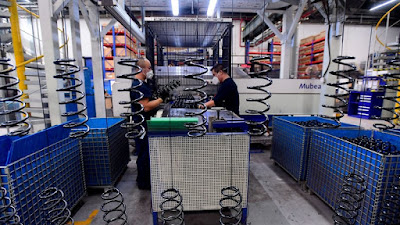The Future is Bright
 A recent study by McKinsey looked at the automatability of different jobs in different industries, and the NPR headline that emerged from such an analysis was stark: "Automation Could Displace 800 Million Workers Worldwide By 2030, Study Says." But here's another, counterpoint headline to add to the discussion: "Why Futurist Ray Kurzweil Isn't Worried About Technology Stealing Your Job." Here's the money quote:
A recent study by McKinsey looked at the automatability of different jobs in different industries, and the NPR headline that emerged from such an analysis was stark: "Automation Could Displace 800 Million Workers Worldwide By 2030, Study Says." But here's another, counterpoint headline to add to the discussion: "Why Futurist Ray Kurzweil Isn't Worried About Technology Stealing Your Job." Here's the money quote:We have already eliminated all jobs several times in human history. How many jobs circa 1900 exist today? If I were a prescient futurist in 1900, I would say, “Okay, 38% of you work on farms; 25% of you work in factories. That’s two-thirds of the population. I predict that by the year 2015, that will be 2% on farms and 9% in factories.” And everybody would go, “Oh, my God, we’re going to be out of work.” I would say, “Well, don’t worry, for every job we eliminate, we’re going to create more jobs at the top of the skill ladder.” And people would say, “What new jobs?” And I’d say, “Well, I don’t know. We haven’t invented them yet.”
Kurweil's expertise is in tech and not poli sci. But he makes an insightful connection to politics in pointing out the asymmetry between the jobs that will be lost (which are real, knowable things that are currently held by people) and the jobs that will be gained (which, who knows what they will be and who will hold them). Which means that politicians will be more nervous about the lost jobs (and the voters who had them) than about the gained jobs (which we can't yet perceive what they'll be and how they'll be distributed).
I don't think it's a controversial statement that we are better off now than 100+ years ago, when two-thirds of jobs were in back-breaking agricultural or manufacturing sectors. Machines have made our lives immeasurably better and easier. Transporting people from 1900 to the present day, they'd wouldn't believe their eyes when they observed the technology, comforts, wealth, and health that we take for granted. And while these multiple generations of automation-driven disruption have created winners and losers, I would argue that despite rampant inequity we are in many ways far better off in terms of equity than we were in our agricultural and manufacturing eras, in which it was impossible to succeed if you were not born into land or capital and in which terrible working conditions were disproportionately borne by the less well-off.
As we look into an uncertain future, it is natural to worry about job loss, and more broadly about growing inequity. We have our work cut out for ourselves to stay competitive and to prepare our children and grandchildren to be competitive. And we need to roll up our sleeves on the issue of inequity, to see to it that people who are particularly vulnerable to economic disruption are reaping the benefit of progress and not getting left behind. But, by and large, by looking at the long game as Kurweil has, we can see that accelerating rates of innovation and automation are welcome trends that hold great promise for society. We may lose 800 million jobs to robots. But we will gain many more, and much more, in return.
Comments